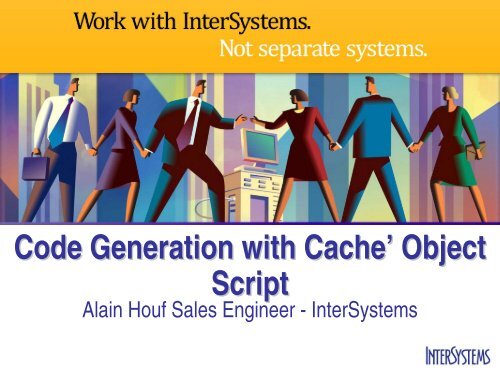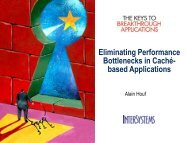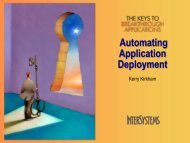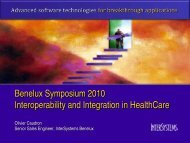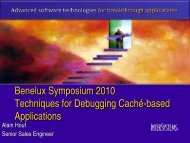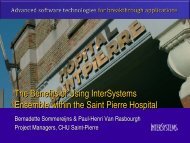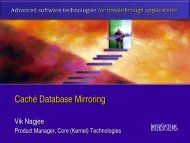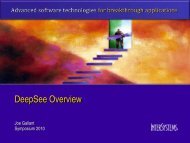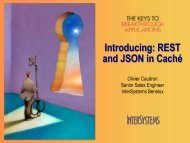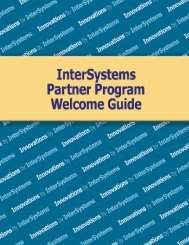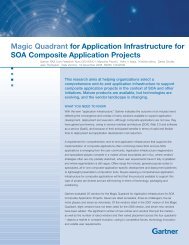Code Generation with Cache'' Object Script - InterSystems Benelux
Code Generation with Cache'' Object Script - InterSystems Benelux
Code Generation with Cache'' Object Script - InterSystems Benelux
- No tags were found...
You also want an ePaper? Increase the reach of your titles
YUMPU automatically turns print PDFs into web optimized ePapers that Google loves.
<strong>Code</strong> <strong>Generation</strong> <strong>with</strong> Cache’ <strong>Object</strong><strong>Script</strong>Alain Houf Sales Engineer - <strong>InterSystems</strong>
<strong>Code</strong> <strong>Generation</strong> <strong>with</strong> Cache’ <strong>Object</strong><strong>Script</strong>• Class <strong>Generation</strong>• Method <strong>Generation</strong>• Routine <strong>Generation</strong>
Class <strong>Generation</strong>
What is a Class Generator?• A program that– reads a external metadata source and generatesxml files that contain class definitions.– Imports the files and generates the businesslogic.
Class Generator• Abstract class %SYSTEM.SQLClassmethod DDLImport(DDLModeDDLMode As%Library.String,……)Parameters: DDLModeVendor from which the script file originated. . Thisparameter is required. Supported values are:FDBMSInformixInterbaseMSSQLServerOracleSybase
Class Generator• Not only for Table definitions but also for storedprocedures– Support for TSQL in Caché– Stored procedure convertor for Informix inCaché 2008/2009
Class GeneratorLoad and compile the file and check for syntax errorsset status = $system.OBJ.Load(xmlfile,"crkf-d")if 'status {do ##class(User.Import).AddError("Problem compilingxml-file: "_xmlfile)}
Method <strong>Generation</strong>
What is a Method Generator?• A small program that is invoked by the class compiler togenerate the runtime code for a method.• A method generator is simply a method of a Caché classthat has its <strong>Code</strong>Mode keyword set to “objectgenerator” .Generated <strong>Code</strong>
A simple method generatorClass MyApp.MyClass Extends %Registered<strong>Object</strong>{Method MyMethod() [ <strong>Code</strong>Mode = objectgenerator ]{Do %code.WriteLine(" Write """ _ %class.Name _ """")Do %code.WriteLine(" Quit")Quit $$$OK}}
Output from the simple generator• When the class MyApp.MyClass is compiledMethod MyMethod(){}Write "MyApp.MyClass"Quit
How Method Generators Work• Resolves inheritance for the class– builds a list of all inherited members.• Makes a list of all methods specified as method generators– by looking at the <strong>Code</strong>Mode keyword of each method.• Gathers the code from all method generators, copies it into one ormore temporary routines, and compiles them– makes it possible to execute the method generator code.• Creates a set of transient objects that represent the definition of theclass being compiled.– These objects are made available to the method generator code.• It executes the code for every method generator.
How Method Generators Work• If present, the compiler will arrange the order in which it invokes themethod generators by looking at the value of the GenerateAfterkeyword for each of the methods.– This keyword gives you some control in cases where there may be compilertiming dependencies among methods.• Copies the results of each method generator (lines of code plus anychanges to other method keywords) into the compiled class structureure(used to generate the actual code for the class).• the original method signature (arguments and return type), as well asany method keyword values, are used for the generated method.– If you specify a method generator as having a return type of %Integer, , thenthe actual method will have a return type of %Integer.• Generates the executable code for the class by combining the codegenerated by the method generators along <strong>with</strong> the code from all thenon-method generator methods.
Method Generators - Context• %code– %Stream.MethodGeneratorclass. This is a stream into which you write the• %classcode for method.– %Dictionary.ClassDefinitionclass. It contains the original definition of theclass being compiled.• %method– %Dictionary.MethodDefinitionclass. It contains the original definition of themethod being compiled.• %compiledclass– %Dictionary.CompiledClassclass. It contains the compiled definition of theclass being compiled. It contains information about the class after inheritancehas been resolved (such as the list of all properties and methods, includingthose inherited from superclasses).• %compiledmethod– %Dictionary.CompiledMethodclass. It contains the compiled definition of themethod being generated.
So how does this work in practice?TM.MyMethodsClassMethod ListProperties() [ <strong>Code</strong>Mode = objectgenerator ]{For i = 1:1:%compiledclass.Properties.Count(){Set prop = %compiledclass.Properties.GetAt(i).NameDo %code.WriteLine(" Write """ _ prop _ """,!")}Do %code.WriteLine(" Quit")Quit $$$OK}
So how does this work in practice? -.MAC#classmethod ListPropertiesListProperties(%class,%code,%method,%compiledclass,%compiledmethod,%parameter) public {For i = 1:1:%compiledclass.Properties.Count(){Set prop = %compiledclass.Properties.GetAt(i).NameDo %code.WriteLine(" Write """ _ prop _ """,!")}Do %code.WriteLine(" Quit")Quit $$$OKq 1 }
NewClass (%Persistent,TM.MyMethods)• When the class NewClass is compiled, a ListPropertiesmethod is generated. You can see this in the NewClass1.intzListProperties() public { Write "%Concurrency",!Write "Name",!Write "SSN",!Quit }
<strong>Code</strong>Mode• Call– this method is an alias for a routine call (used forwrapping legacy code).• <strong>Code</strong>– this method is implemented as lines of code (thedefault).• Expression– this method is implemented as an expression.• <strong>Object</strong>generator– this method is a method generator.
<strong>Code</strong>Mode - expression/// Converts %val, which represents a logical time value/// (number of seconds since midnight), into ODBC time format./// Returns the ODBC time string for the logical time value %val.ClassMethod LogicalToOdbc(%val As %Time = "") As %String [<strong>Code</strong>Mode = expression, ServerOnly = 1 ]{$select(%val="":"",1:$ztime(%val))}
A simple property <strong>with</strong> %TimeClass TM.NewClass1 Extends %Persistent{Property NewProperty1 As %Time;}The compiled property has a generated methodzNewProperty1LogicalToOdbc(%val="") Quit select(%val="":"",1:$ztime(%val))
Implementing Parameters <strong>with</strong> <strong>Code</strong><strong>Generation</strong> -TechStatus/// Active StatusProperty TechStatus As SQ.MHMultChoice(DISPLAYLIST =",Active,Inactive,Active", MAXLEN = 8, SELECTIVITY ="25.0000%", VALUELIST = ",,N,Y") [ SqlColumnNumber = 3 ];
}LogicalToOdbc method - MultChoiceClassMethod LogicalToOdbc(%val As %String) As %String [ <strong>Code</strong>Mode = generator ]{n i,len,seps %code=0i %parameter("VALUELIST")'="",%parameter("DISPLAYLIST")'="" d QUIT $$$OK. s sep=$e(%parameter("VALUELIST")). s len=$l(%parameter("VALUELIST"),sep). f i=2:1:$l(%parameter("VALUELIST"),sep) $$$GENERATE("q:%val="_$$quote($p(%parameter("VALUELIST"),sep,i))_" "_$$quote($p(%parameter. $$$GENERATE(" q """"")s %codemode=$$$cMETHCODEMODEEXPRESSIONs %code="%val"QUIT $$$OK
Implementing Parameters <strong>with</strong> <strong>Code</strong><strong>Generation</strong> -TechStatus/// Active StatusProperty TechStatus As SQ.MHMultChoice(DISPLAYLIST =",Active,Inactive,Active", MAXLEN = 8, SELECTIVITY = "25.0000%", VALUELIST =",,N,Y") [ SqlColumnNumber = 3 ];zTechStatusLogicalToOdbc(%val) q:%val="" "Active"q:%val="N" "Inactive"q:%val="Y" "Active"q ""
Routine <strong>Generation</strong>
What is a Routine Generator?• A program that generates at runtime (creates/compiles)code to be executed.• This routines can contain COS, embedded SQL and <strong>Object</strong>methods.
Routine GeneratorSet routine =##class(%Routine).%New("MyRoutine.MAC")//Write lines of code to the routineDo routine.WriteLine("MyRoutine")Do routine.WriteLine("Tag()")Do routine.WriteLine(" Write ""This is my routine"",!")Do routine.WriteLine(" Quit") ;//save the routineDo routine.Save() ;//compile the routineDo routine.Compile() ;// close the routine objectDo routine.%Close()
Routine GeneratorMake use of the %Dictionary Classes•##class(%Dictionary.CompiledClass).%OpenId(classname)•Properties.GetAt(x) (%Dictionary.CompiledProperty)•Storages.GetAt(x) (%Dictionary.CompiledStorage)•Indices.GetAt(x)(%Dictionary.CompiledIndex)
Routine GeneratorUse $ZOBJMETHOD,$ZOBJCLASSMETHOD and$ZOBJPROPERTY for more generic way to refer to classlogic and propertiesset ClassmethodName = "%OpenId"set obj=$ZOBJCLASSMETHOD(tabelnaam, ClassmethodName, Key)set objp=$ZOBJPROPERTY(obj,propnaam)if (objp) {set id=$ZOBJMETHOD(objp, "%Id")set classname=$ZOBJMETHOD(objp, "%ClassName",2)}
More info• Examples of method generation– %Library.Persistent,, %Library.PopulatUtils%Library.PopulatUtils,%XML.Adapter• Examples of class generation– ftp.intersystems.com• /pub/dbms/FDBMSToCDL_41_009.zip• /pub/dbms/FileMan2Cache_5_0_10.zip• Method Generator documentation– http://www.intersystems.com/cache/downloads/documentation.html– Keyword - method generator
Examples• <strong>Generation</strong> of Methods– User.email as datatype that extends %String– Abstract class <strong>with</strong> methods• %OpenPk• %ExistsPk• Used @ Spector, , Fed Pol, Iknow
Examples• <strong>Generation</strong> of ClassDefinitions– Complete classdefinition exists in Excel -file– <strong>Generation</strong> of XML files from this file– Loading, compiling and tune of the tables• Used @ Fed Pol for datawarehouse and questis servers
Examples• <strong>Generation</strong> of Routines– Class User.Import, , methods• GeneratieRoutine• GeneratieRoutineMulti• Used @ Fed Pol, , replacement of +270 Stored proceduresby 1 single routine that generates and executes the loadlogic
Thank You!!


